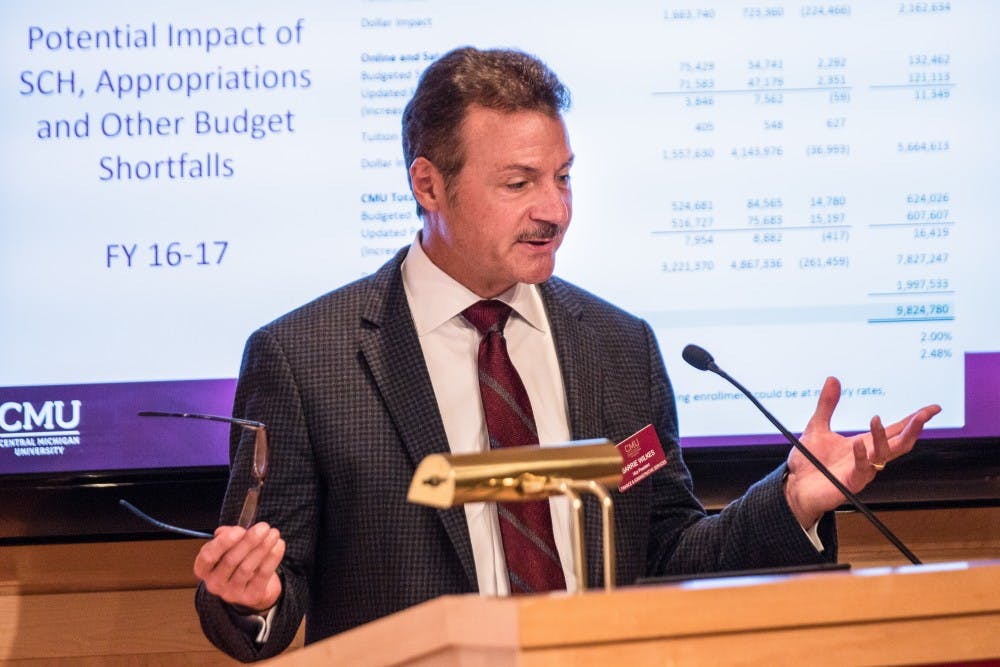$9.8 million budget deficit discussed at budget forum

The $9.8 million budget deficit Central Michigan University is facing was discussed Wednesday at the Budget Priorities Committee fall forum at the Charles V. Park Library auditorium.
A student in the crowd asked if the largest subsidies in the budget — the Athletics Department and the College of Medicine — would be considered for cuts.
"With the exception of the advancement office and the admissions and student success areas … all areas of the university will be subject to reductions (including) athletics," said Barrie Wilkes, vice president of finance and administrative services. “At this time athletics is going to be subject to budget reductions. Those are the instructions I have received.”
An auditorium filled with staff, students, faculty and administrators listened to Wilkes explain the factors that contributed to the budget deficit. The audience provided insight and asked questions about what this means for the campus community.
“$9.8 million dollars is what we anticipate the shortfall will be,” Wilkes said. “We anticipate that using projected spring numbers, so we won’t know until January or February what that number really is.”
All of the details have not come in yet to determine which areas or programs saw more of a shortfall in enrollment, said Joe Garrison, director of financial planning and budgets. Garrison said the deficit was configured using “conservative” data to plan for a “worst case scenario.”
Contributors to the $9.8 million deficit include lower than anticipated enrollment on campus, online and satellite locations, and lower than projected state appropriations.
Credit hours for main campus were 5,070 less than expected, contributing $2.16 million to the deficit. For online and satellite locations, there were 11,349 less than anticipated credit hours, which added $5.66 to the deficit. State appropriations and other budget shortfalls made up about $2 million of the nearly $10 million deficit.
“The decline in Global Campus is not in online,” said President George Ross. “It’s face to face. (Enrollment) in classrooms at satellite locations has dropped off tremendously. We have to find a way to increase online because right now people coming into the classroom at Global Campus has declined tremendously. Those people want (courses).”
In terms of the state appropriations shortfall, the budget was taken to the board in June with a $1.4 million dollar shortfall in state appropriations Wilkes said.
The reason for this, Wilkes said, was that the state hadn’t finalized its budget when CMU was building theirs. Because of this, they used a prediction of what the appropriations would be, which ended up being less than what the state actually gave CMU.
In terms of reductions, Ross said areas that directly affect students such as advising and counseling, as well as fundraising “won’t be touched.”
“We’ll look across the total university for all the colleges across all of the service centers,” Ross said. “Everything is on the table.”
Working to address the deficit will likely be a combination of things, Ross said, including lessening costs and saving money by not filling unnecessary staff positions.
“For this year we can use base reductions and one time dollars (to address the deficit),” Wilkes said.
Some examples of how colleges can operate under tight budgets were given at the beginning of the forum by Ian Davison, dean of the College of Science and Engineering.
One of the main ways his college has been able to save money is by not immediately filling positions when there is staff turnover, Davison said, or filling positions temporarily with faculty that get paid less.
Ross said he was pleased with the outcome of the budget forum.
“I’ve never seen this many people at a budget forum,” Ross said. “We talked openly about the budget and the challenges and what we’re facing. I think it was great what we did here today.”



